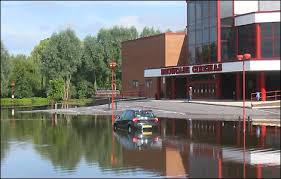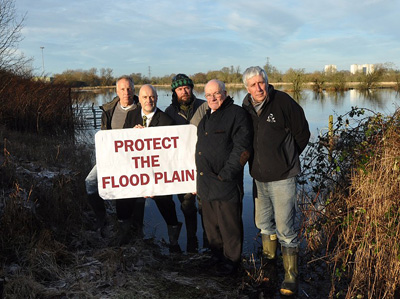I like to think of myself as a relatively even tempered sort of a bloke but I have to admit that listening to the garbage being spouted by the press, politicians and a fair few of general public over why rivers valleys are flooding this winter does wear my patience a little thin.
Supposedly intelligent people come up with the most ludicrous theories when it comes to this subject and I am getting heartedly sick of politicians spouting facts about flood defence and dredging that simply aren’t true. This is one subject where us anglers usually know more than most about how river catchments work and why things happen the way they do.
 I’ll never forget taking part in a debate in the House of Commons in the aftermath of the 2003 floods where the then MP for Marlow, not usually a stupid man, was trotting out some conspiracy theory about how the Jubilee River, a Thames flood relief channel which bypasses the vulnerable and low lying areas around Windsor and Maidenhead and discharges back into the main river below Slough, was causing the Thames to back up and flood his constituency. I couldn’t resist reminding the Honourable Member that water tends not to flow up hill and certainly not for some ten miles and over several weirs!
I’ll never forget taking part in a debate in the House of Commons in the aftermath of the 2003 floods where the then MP for Marlow, not usually a stupid man, was trotting out some conspiracy theory about how the Jubilee River, a Thames flood relief channel which bypasses the vulnerable and low lying areas around Windsor and Maidenhead and discharges back into the main river below Slough, was causing the Thames to back up and flood his constituency. I couldn’t resist reminding the Honourable Member that water tends not to flow up hill and certainly not for some ten miles and over several weirs!
Mind you this is nothing compared to what was posted on YouTube this month in the aftermath of the flooding in the Loddon Valley in Berkshire. The caption accompanying some impressive aerial photography of the middle Thames floodplain looking decidedly soggy claimed that the floodwaters were due to the operation of the Thames Barrier some 50 miles downstream below the Port of London.
As my local EA fisheries officer pointed out, for the Thames Barrier to cause any significant backing up, even as far as West London never mind Berkshire, the top of St Paul’s Cathedral would have been under several feet of flood water.
Recently I have had to patiently explain to a number of otherwise sensible folk that the Environment Agency isn’t actually deliberately deciding to sacrifice community A to save community B. Once a major river is overtopping the weirs, banks and locks there is no control as to where the floodwaters go – save for the force of gravity. Water finds its own level and no amount of fiddling with submerged lock gates or weir paddles is going to make the slightest bit of difference in a critical flood event. The more relevant question to ask is why are we having more serious floods –possibly something to do with allowing irresponsible development and intensive agricultural practices on the floodplain?
I don’t always agree with the guy but there was a superb piece in the Guardian recently by George Monbiot that sets out precisely why draining the headwaters of river catchments, concreting over the water meadows and straightening and dredging river channels has seen floodwaters charging downstream at an ever more alarming rate…
By failing to store floodwater higher up the systems in nature’s reservoirs we are quite deliberately creating more and more flooding misery. Worse still, we are incentivising farmers to carry on with the same damaging practices and we have a government which seems hell-bent on deregulating harmful dredging and loosening planning protections in the floodplain.
You can check out the feature HERE – it’s well worth a read

At the Angling Trust we have been working with other environmental groups to warn that government policies are making flood damage more, not less, likely and that their proposed cuts will limit the ability of the Environment Agency to offer help, warning and support to flood-hit communities. Both the Prime Minister and the Environment Secretary have claimed that flood defence work was being protected from planned cuts but it is now clear this is not the case.
HERE is a particularly good piece from Friends of the Earth, which takes apart the claims on flood defence spending.
And of course many of the 1,700 EA staff whose jobs are set to disappear in the next year are either working directly in flood defence, or have been seconded in from other parts of the Agency such as Fisheries, Planning, Waste Control or Mapping during the recent floods to help out. If their jobs are cut, there will be fewer staff to provide back up in future floods and other functions – such as pollution prevention and enforcement – will struggle to deliver their statutory duties effectively.
Furthermore, Environment Secretary Owen Paterson’s attempts to deregulate dredging in water meadows, so vital for storing flood water, flies in the face of advice from his own department who have warned that this could contribute to an increase in flood risk further downstream by creating higher flood peaks. In a study published last year the Environment Agency issued a dire warning against increasing dredging in the floodplain which concluded that far from reducing flood risk dredging can: ‘speed up flows and potentially increase the risk of flooding downstream.’
And just when it seemed that things couldn’t get much worse came the well sourced report in the Telegraph that the Coalition Government is preparing to mount a fresh assault on planning laws by giving developers the power to push though applications without the need for council approval or environmental assessments, including the requirements to incorporate flood defences and to protect important water meadows.
Not a pretty picture is it?
 I can only repeat the message we put out to our politicians this week in the hope that as we wait for the inevitable next round of flood misery they begin to wonder whether their own policies might just have been part of the problem.
I can only repeat the message we put out to our politicians this week in the hope that as we wait for the inevitable next round of flood misery they begin to wonder whether their own policies might just have been part of the problem.
‘Rather than paddling around in the floodplain crying crocodile tears for the victims of the floods, politicians of all parties should start unwinding policies and plans that will make a bad situation many times worse.
It is crassly irresponsible to be axing any posts in the already over-stretched Environment Agency when we know climate change is going to make extreme flood events more, not less likely. Relaxing planning consents and deregulating dredging on the floodplain is downright stupid and flies in the face of evidence and advice from the government’s own experts and advisors…
As anglers we know how dangerous rivers can be and how important it is to avoid situations where water is running off the floodplain and into already overloaded river channels. We can’t dredge our way out of flooding but we can call a halt to policies that prevent the water meadows from doing their job and operating as natural reservoirs. Functioning water meadows are good for the environment, good for fish and wildlife and are the best flood defences we can have.’
Is anyone out there listening?
This feature forms part of Martin’s Angling Trust Fighting for Fishing blog and is reproduced in an edited form here on FishingMagic with his kind permission.










